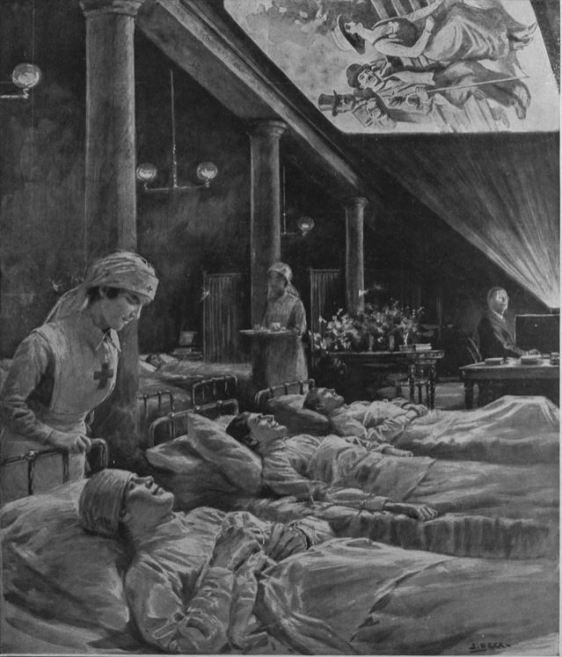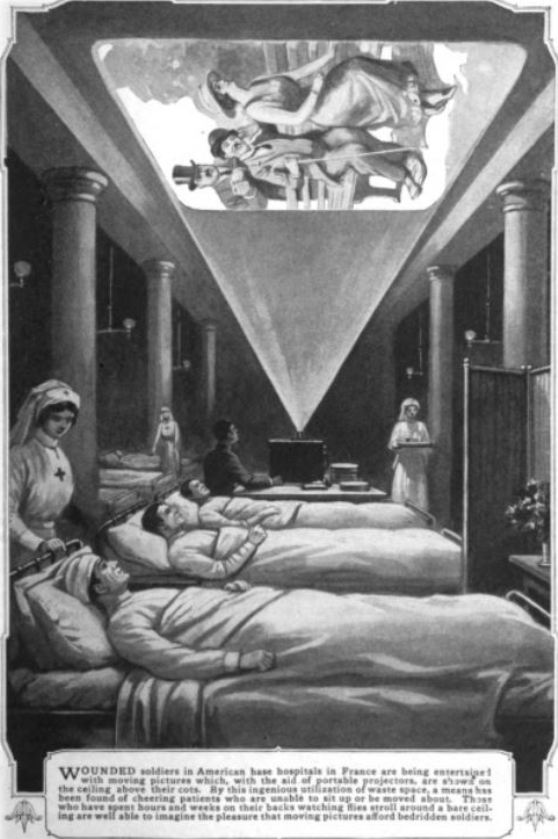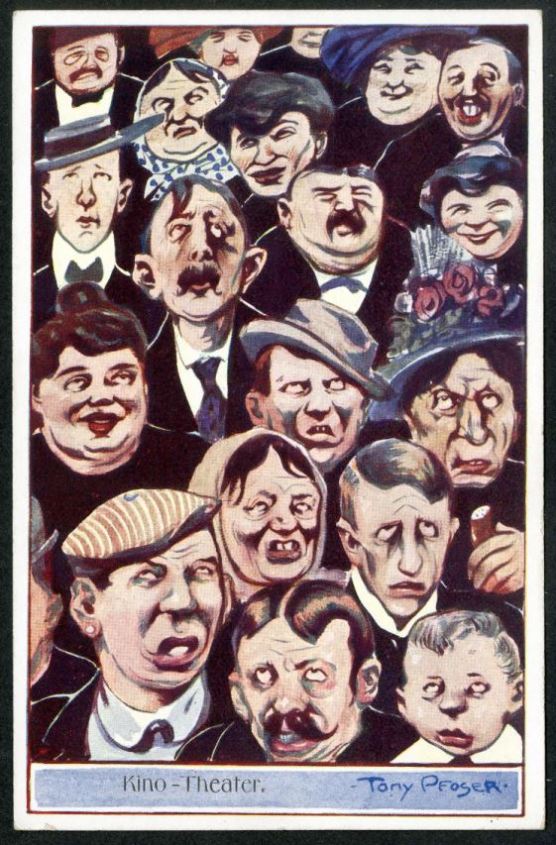Source: Violet Hunt (with a preface and two additional chapters by Ford Madox Hueffer), The Desirable Alien at Home in Germany (London: Chatto and Windus, 1913), pp. 281-287
Text: I had never seen a cinematograph show until I came to live in Germany. I was then told that England abounded in them, and that this wild joy was at hand, and had been at hand for years in the two main streets that bounded my dwelling. I had never, so far, discovered them never known this famous form of amusement. Now I live in them. I am only sorry that the censor has lately been allowed to have anything to do with them; for now I shall never see again what I saw in the course of my first cinematograph the … No! Joseph Leopold, taking upon himself the office of the much-abused functionary, says that I am not to set down what I saw. At any rate, it was the triumph of the unexpected, and that surely is the salt of cinematographs and entertainments generally. And it was nothing wrong it was only out of place, and would not have been out of place in a musical comedy nay, it would have been indicated. … I burn to say what it was. …
Joseph Leopold does not take a frivolous view of this enormous international development. The cinematograph is an institution; it is educational; it is, at any rate, reading without tears.* It is vastly inducive of a philosophical attitude of mind; it is a vivid, cogent object-lesson in the sequence of events. The couple of stories usually given historical, cosmopolitan, revelatory of varieties of national character, as even the more laughable films are must be provocative of something like the prophetic powers that a study of history, past and present, gives.
A Hoch Spannendes Detective Drama may, in its details, pander to a vulgar taste, but it is pretty certain to reach the level of the intelligence it is designed to impress. Possibly some forger has been turned from his wickedness, some fool from his folly, some potential murderer from his crime, by the sight of one of these dramas of financial ruin, of blood and revenge, even though, owing to the obvious imperfection of the medium, blood cannot run red or the face of the ruined man blanch. It is better so; it is better, as Shakespeare’s Helena said, that “the white death should sit on their cheeks for ever,” for the coloured films are abominable. But as it is, I should not mind wagering that conscience money has been paid as a result of some evening spent in a red plush-covered armchair, with an antimacassar slung over the back of it a square of tawdry lace that is apt to follow you out into the street.
And are no simple souls induced to a more tolerant rule of piety after seeing, say, “The Bellringer,” where the devil terrifies the ancient functionary from ringing the Angelus, and only gives him leave to pursue his calling on condition that the devil shall take the first soul that enters the church while the bell is ringing? It is hard on the soul, but the philosophy of the scapegoat is sound enough. The innocent, since medieval times, must suffer for the guilty. And an angel from Heaven, her wide wings disguised under a beggar’s cloak, enters the church, and rings the bell for the charitable old bellringer, who has stooped in the porch to succour her.
This is, of course, a film which would not obtain in a Protestant town. And others which I have seen in Germany would be prohibited in England for the sake of the young person.
People rail in England against this large-looming personage, and her invasion of the library committees and the stalls at the “problem” plays, so dear to the English soul. But we have a short way with her in Germany. English people, who have a reasonable zest for seeing life as it is, complain that they are driven by their parental susceptibilities to read milk-and-water stuff, and view plays that are only fit for babes. But no one suggests that the onus of chaperonage might be thrown on the police, as it is in Germany, and the young person, deaf to moral suasion of parents, kept by armed force from the book or the play, instead of the play or the book from the young person! Yet it is practically so in Germany as far as the theatre is concerned. Reasonable plays are put on and enjoyed by the elders. An angel with a flaming sword stands at the gate of the theatrical Eden and forbids the young of both sexes to enter Paradise before their time i.e., eighteen years old. The Chief of Police prescribes to what plays young men and maidens under this age shall be admitted or no, and places a simple policeman at the doors of the theatre to enforce his behest.
And as for children of tender years, the Germans see that the lesson shall not be too strong, too deeply driven home to the tender intelligence. When a film that may prove a bugbear is presented, or one holding the powers-that-be up to execration or vilifying the Army, and any other lawfully consstituted authority, children are not allowed to enter at all.
It is impossible for local governments to take such a tender interest in the morals of their subjects without the conflict of authorities producing some odd results. It must never be forgotten that Germany is a mass of little, ill-welded nationalities, all under a First War Lord. That is what the Kaiser literally is. The curious local jealousies existing between one State and another are the unknown factor, and make a topsy-turveyness which in operation remind one of an opera of Gilbert and Sullivan.
There is one famous film, “Heisses Blut,” which was prohibited in Frankfort and forbidden to be performed in Trier. That is why I was able to see it in H—, because H— is in Hessen-Darmstadt, not in Prussia. And it is really, as its name denotes, a “Spannendes Drama.” A beautiful and famous Danish actress has played in the preparation of the film the part of the woman of strong passions united to a gentleman unable to satisfy them. She casts her affection on the new chauffeur, and makes an assignation with him during her husband’s absence. He returns and surprises the pair, and turns the temperamental lady and her lover out of the house. The degraded one becomes a burglar’s mate, and we see her in a thieves’ kitchen concocting a plan for the breaking into her former abode. She is persuaded by her truculent chauffeur lover to dress as a boy, to scale the window and let him in. She naturally chooses the nursery window. By her boy’s cot the ex-husband finds her; she confesses, and he takes her back. Hoch Spannendes, indeed!
For novelists like Joseph Leopold and me the rage for picture theatres is a distinct gain. It may be the novel-form of the future. When there will be so many books published that no one has time to read them, the author, wise before his time, will devote his intelligence to the presentation of his message, whatever it is, through this hasty medium, to all who will not wait for the development of style, niceties of dialogue, and so on. It is not perhaps generally known that the actors who take the parts of characters in a film accompany all their gestures, for the sake of vraisemblance, with speeches appropriate thereto half gag, half set down for them.
But without envisaging such a total abnegation of the merits of style in the future, let us see that in so far as the present condition of things affects authors they have all to gain by the tales that are told nightly in dumb show. The audience, composed pretty nearly of rustics in the classical sense, unsophisticated, unlettered, slow at apprehending the contortions, the mysteries of a good plot, will gradually get more and more used to following its peripatetics, tracing out its issues, holding the multiple strands that go to make a story, weaving them gradually, skilfully, into the main one, till by the time the light suddenly grows in the “Saal,” and the Pathe cock seems to stand on the empty sheet and crow triumphant, the whole has grown coherent in their minds. It is magnificent training for readers. We see in “Das Gefahrliche Alter,” another good German film, the spendthrift at the restaurant confronted by la douloureuse, and the elegant harpy who has cost him so dear at his side egging him on: “Get the money to pay it!” Her speech is given in writing on a board, but it is hardly necessary the context is explanatory enough. The slide shifts, we see his mother weeping over her secretaire, where notes for fifty pounds are tumbling about, mixed with correspondence cards, as they will in the desks of mothers in films. We see her go to bed. And in the next slide her son appears, walking in the peering, creepy way which is suggestive of proposed criminal attempts on secretaires. … And so on and so on, to a mother’s inevitable forgiveness.
Yes, I consider the advent of the Boy Scouts, the invention of picture postcards, and the rage for picture theatres, as the three most important developments of this age of brass and iron.
* The village of Kreuzberg on April 14, 1913, allocated £50 of its yearly revenue to purchasing seats for poor children at the local cinematographs on Sundays throughout the year. J.L.F.M.H.
Comments: Isobel Violet Hunt (1862-1942) was a British author, feminist, associate of the Pre-Raphaelites, and literary hostess. Closely linked with many of the literary notables of her age, she was the lover of the Anglo-German novelist Ford Madox Hueffer, who later changed his name to Ford Madox Ford and portrayed her as Sylvia Tietjens in his novel series Parade’s End. He collaborated with her on this book, which is a record of her impressions of time spent in Germany over 1911/12. ‘Joseph Leopold’, identified as her companion in the book, is Ford Madox Hueffer (his giveaway initials J.L.F.M.H. follow the footnote about poor children in cinemas). Heisses Blut (Germany 1911) starred the Danish actress Asta Nielsen. There were two German films entitled Das gefährliche Alter made in 1911. I have not been able to identify the ‘Bellringer’ film. Eyewitness accounts of cinemagoing at this period which refer to artificially coloured films are rare.
Links: Copy at Hathi Trust


